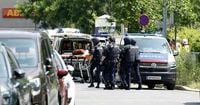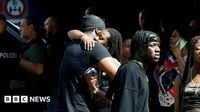On June 10, 2025, the Austrian city of Graz was shaken by a tragic school shooting that has now claimed the lives of 11 individuals, including students and at least one adult. The attack, which took place at Dreierschützengasse secondary school in the north-west of Graz, marks the deadliest gun attack in Austria’s recent history and one of the worst school shootings in Europe in years.
The assailant, a 21-year-old former student of the school who had not graduated, entered the campus armed with a legally owned pistol and a longer firearm, described by officials as either a shotgun or a rifle. Police believe he acted alone during the rampage, which began around 10 a.m. local time when gunshots were heard inside the school. After killing nine people on the scene, the gunman took his own life in a school bathroom. A tenth victim later died from injuries sustained in the attack, bringing the death toll to 11.
Interior Minister Gerhard Karner confirmed that among the dead were six females and three males, with most victims being pupils. Twelve others were injured, some seriously, and rushed to hospital. Officials have refrained from releasing the identities of the victims pending further investigation. The motive behind the shooting remains unclear, and police are continuing their inquiries.
The response to the shooting was swift and extensive. More than 300 police officers, including the COBRA tactical unit—Austria’s equivalent of a SWAT team—were deployed to the scene, alongside 160 ambulance and first-aid personnel. The entire school was evacuated by 11:30 a.m., and a nearby stadium was opened as a safe gathering point for students and their families. Authorities have since secured the school, confirming that there is no ongoing threat to the public.
Graz Mayor Elke Kahr described the incident as a “terrible tragedy,” while Austrian Chancellor Christian Stocker, who immediately traveled to Graz, called the shooting a “national tragedy that has deeply shaken our entire country.” Stocker declared three days of national mourning and announced a nationwide minute of silence to be held on June 11 at 10 a.m. local time. Flags at the Hofburg Palace in Vienna will fly at half-mast in honor of the victims.
In a somber press conference, Chancellor Stocker reflected on the devastating impact of the attack, stating, “A school is more than just a place to learn—it is a space for trust, for feeling comfortable and for having a future.” He emphasized how this safe environment had been “violated” by the violence, adding, “In these difficult hours, being human is our strongest point.”
The shooter, an Austrian man from the wider Graz region, was reportedly not known to police prior to the attack. Authorities found a farewell note during a search of his home, though its contents have not been disclosed. Some media reports suggested the suspect had been a victim of bullying, and he opened fire in two classrooms, one of which he had once attended.
This incident is particularly shocking in Austria, a country with strict gun regulations compared to the United States, where school shootings are far more frequent. Austrian gun laws allow the purchase of certain firearms, such as manually reloaded rifles and shotguns, without a permit after the age of 18, provided there is no weapons ban on the buyer and the weapon is registered in the central weapons register. More advanced firearms, including repeating shotguns and semiautomatic guns, require a gun ownership card and a firearms pass.
Austrian civilians are among the most heavily armed in Europe, holding approximately 2.6 million guns, though only about 837,000 are registered. This equates to roughly 30 firearms per 100 people, placing Austria 12th worldwide in gun ownership per capita. In contrast, the United States has about 120.5 guns per 100 people. Despite this, mass shootings in Austria remain rare, with only two incidents recorded between 2000 and 2022.
The scale and nature of the Graz shooting have stunned the local community and the nation. Graz, Austria’s second-largest city with around 300,000 residents, is considered a peaceful university town. The event has left residents grieving, with many lining up at blood donation centers to help the injured. Stephanie Koenig, a 25-year-old donor, told Reuters, “Today is a hard day for all of us in Graz. I’m here to donate my blood to help other people who need it.”
Experts note that while Europe experiences fewer school shootings than the United States, such incidents, though rare, do occur. Marieke Liem, a professor of violence and interventions at Leiden University, explained that the availability of firearms correlates strongly with homicide rates and mass shootings globally. She remarked, “The higher the gun availability, the higher the homicide rate globally.”
She also pointed out that upticks in gun violence in Europe often trace back to criminal activities such as gang or drug-related violence, making shootings like Graz’s particularly unusual. Yet, she cautioned that as long as guns and young people coexist, it is difficult to completely eliminate such tragedies.
Austria’s recent history includes other violent incidents, such as the 2020 Vienna attack where a jihadist killed four people and wounded 23 others. In 2016, a gunman opened fire at a concert in the town of Nenzing, killing two before taking his own life. A decade ago, Graz itself experienced a mass attack when a man killed three people and injured dozens more by driving into crowds and attacking bystanders with a knife.
European Commission Vice-President Kaja Kallas expressed her shock on social media, stating, “Every child should feel safe at school and be able to learn free from fear and violence.” German Chancellor Friedrich Merz also sent condolences, describing the event as a “dark hour” for Austria.
The investigation continues as authorities gather evidence and call on witnesses to submit any photos or videos related to the shooting. The school remains closed until further notice, and the community of Graz, along with the entire country, mourns the loss of young lives cut tragically short.


